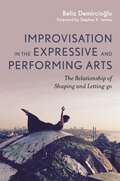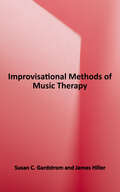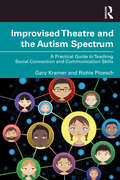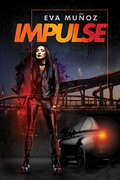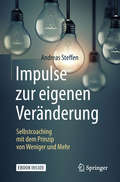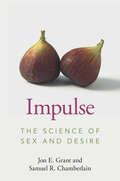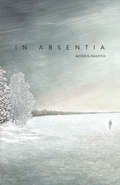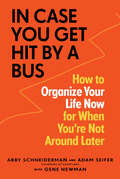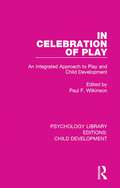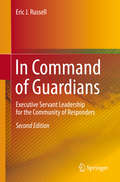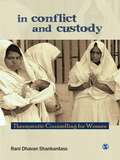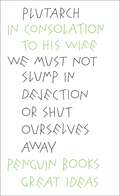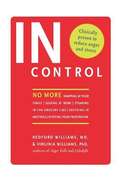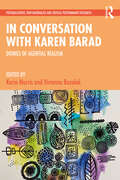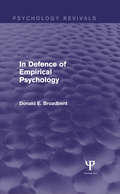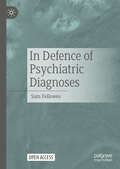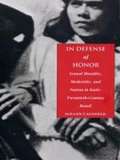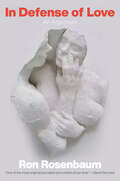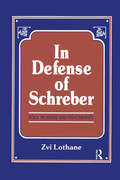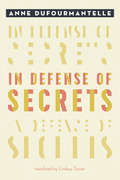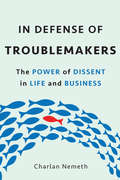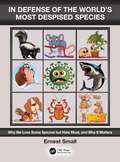- Table View
- List View
Improving the Quality of Child Custody Evaluations
by William O'Donohue Lauren Woodward TolleThis book resolves a key problem that all evaluators need to attend to:, i.e., what constructs ought to be measured?, all the while giving them practical ways of doing this. It also presents data showing family court judges like the model, and it does this fairly briefly but in a way that is nicely embedded in the research literature.
Improvisation in the Expressive and Performing Arts: eBook
by Stephen K. Levine Beliz DemirciogluThis book explores the process of improvisation and outlines the ideal conditions for an inspirational creative state. Examining her own process as an artist and drawing on interviews with peers, the author considers how the forces of shaping (intellect-driven decisions) and letting-go (more intuitive moves) interact in improvisation.The book follows the journey of seven performing arts graduates and undergraduates, examining their experiences of improvisation and the interplay of shaping and letting-go. It reveals how the approach and methods of expressive arts can enrich an improviser's experience and spur the desire for discovery.
Improvisational Methods of Music Therapy
by James Hiller Susan C. GardstromImprovisational Methods of Music Therapy is the second in a series of textbooks addressing each of the four music therapy methods employed in a variety of clinical contexts. Students and professionals alike will gain foundational knowledge about Clinical Music Improvisation (CMI) and its many variations as pertinent to individual, dyadic, and group improvisation. <p><p> This book is specifically intended as a general roadmap for the design and implementation of therapeutically relevant, effective, and individualized improvisation experiences applicable to a wide range of clinical profiles and interpersonal and cultural contexts. As such, Improvisational Methods of Music Therapy addresses prerequisites, risks, contraindications, inherent affordances, and challenges related to CMI, with overarching considerations and procedural steps for Instrumental, Vocal, and Body Improvisation. Attention is given to the use of CMI toward both client achievement of predetermined and measurable therapeutic objectives (i.e., outcome-oriented practice) and client identification and exploration of needs as they manifest in the musicing process (i.e., experience-oriented practice). Hypothetical case illustrations and summaries of actual clinical cases highlight particular CMI variations and procedures.
Improvised Theatre and the Autism Spectrum: A Practical Guide to Teaching Social Connection and Communication Skills
by Gary Kramer Richie PloeschThis guide provides educators, professionals, and parents with an easy-to-follow and comprehensive approach to utilizing improvised theatre as a tool to teach social and communication skills to individuals on the autism spectrum. Opening with the philosophy of the curriculum and the considerations of mental health, play, and environmental factors on individuals with autism, the book then breaks down specific activities, suggests course sequencing, and explains how each activity works and applies to desired outcomes. Packed with dozens of activities and explanations, the book includes all the information necessary to design a full curriculum or create an at-home learning program for parents. By combining the fun and engaging atmosphere of improvisational theatre with the systematic teaching of social skills, professionals and parents can cultivate learning in a way that keeps students engaged while providing long-lasting improvements in social interaction, self-confidence, and communication.
Impulse
by Eva MuñozWelcome, Motor Heads, Rally Girls, and Hangers-On! It’s another wild ride here at the Gathering—the underground world of fast cars, crazy drivers, and partying all night long. If you’re here, it means you’ve broken curfew. Not something the ruling Mob of Terra One encourages, but we’re all in the same boat, so let’s rock it! As long as you’ve paid off your local Associate, you’ll be fine. Maybe. Tonight’s race features racing royalty, ladies and gents! Let’s welcome seventeen-year-old Rebecca “RC” Camille, third in the Driver’s Index. She lives to race. Nothing but motor oil running through her veins, folks. Her aim? To be number one, beating out two of the boys she grew up with at the Open Arms orphanage. She’s lethal in her GT500KR. Nothing gets in her way. Not a sense of brotherhood. Not even love. Her challenger tonight? A psychotic serial killer willing to stop at nothing to eliminate the competition. Can RC stop him before he kills his way to the top? Or will she need reinforcements from the authority we all love to hate? Remember, children, the Mob never gives away their help for free.
Impulse zur eigenen Veränderung: Selbstcoaching mit dem Prinzip von Weniger und Mehr
by Andreas SteffenLassen Sie sich von diesem Selbstcoaching-Buch inspirieren, wie Sie sich persönlich weiterentwickeln könnenIn seinem Sachbuch „Impulse zur eigenen Veränderung“ gibt Ihnen Autor Andreas Steffen eine Vielzahl von Anregungen und Übungsmöglichkeiten zum Selbstcoaching. Es geht darin um Themen wie:SelbstwirksamkeitWahrnehmungWiderstandskraftSelbstannahmeAkzeptanzAchtsamkeitSinnhaftigkeitGlaubenssätzeEigenverantwortungEntscheidungsfähigkeitAndreas Steffen verfolgt damit das Ziel, Ihnen Impulse für Ihren ganz persönlichen Weg der Veränderung zu geben. Sie finden in seinem Selbstcoaching-Buch tolle Anregungen, Werkzeuge, Modelle, Methoden und auch verschiedene Übungen „für den Hausgebrauch“ - also für Ihr ganz persönliches Selbstcoaching. Mit Selbstcoaching die Basis für neue Entwicklungen schaffen, Ziele setzen und diese erreichenDer Autor verfolgt damit das Ziel, Ihnen Impulse für Ihren ganz persönlichen Weg der Veränderung zu geben. Wenn Sie etwas in Ihrem Leben verändern wollen, dann ist es entscheidend, dass Sie Ihre eigene Ausgangssituation erkennen und akzeptieren. Dieser Schritt ist beim Coaching in Entwicklungsprozessen von sehr großer Bedeutung – und erst recht beim Selbstcoaching. Erst dann ist eine positive Veränderung möglich und Sie können sich selbst ein realistisches Ziel für Ihre persönliche Entwicklung setzen. Die Fähigkeit zur Veränderung liegt in jedem von uns. Oft ist dieses Potenzial jedoch hinter einschränkenden Glaubenssätzen und unter viel emotionalem Ballast verborgen, die uns in unserer Motivation bremsen. Dieses Selbstcoaching-Buch vermittelt Ihnen, dass Sie mit einer gesunden Einstellung zu sich selbst, zu den eigenen Gedanken, Emotionen und Gefühlen sowie zur umgebenden Welt die optimale Basis für positive Veränderungen, Selbstwirksamkeit und zukünftige Entwicklungen in Ihrem Leben schaffen. Hierfür werden Ihnen Impulse durch leicht anwendbare Werkzeuge, praxistaugliche Methoden, anschauliche Beispiele und vielfältige Denkanstöße angeboten.
Impulse-Control Disorders (The State of Mental Illness and Its Ther #19)
by Autumn LibalHave you ever known that you shouldn't do something, but just couldn't stop yourself? Of course you have! Perhaps you couldn't resist having one more piece of birthday cake. Maybe your brother or sister made you so mad that you couldn't help yelling. Everyone experiences uncontrollable impulses like these sometimes. But what if these impulses happened to you all the time? How would you interact with your family, do your work at school, or make friends if you couldn't control your impulses? Jeremiah, for instance, loved fire. He loved everything about it--the way it looked, the way it smelled, how its heat enveloped everything. Even though he knew it was wrong, Jeremiah lit fires and watched them incinerate, eat, and destroy everything in their paths. Jeremiah also liked the smoke detectors in his house. He loved taking them apart. Sometimes, after school, Jeremiah would sit in his room, dismantle the smoke detector piece by piece, and then put it back together. Once the smoke detector was reassembled, Jeremiah would light a match beneath it and time how many seconds it took before the detector let out its high-pitched squeal. People like Jeremiah cannot control all the impulses they feel. Some people may get uncontrollably angry, steal, light fires, gamble, pull their own hair, or perform other impulsive actions that are harmful to themselves, their families, and their friends. When a person has repetitive impulses like these, he may be suffering from a psychiatric condition known as an impulse-control disorder. The stories and information in this book will tell you more about impulse-control disorders, how they affect people's lives, and how they can be treated.
Impulse: The Science of Sex and Desire
by Jon E. Grant Samuel R. ChamberlainSex is everywhere in modern society, yet it remains taboo. We all have questions about sex that are too uncomfortable to ask – how do we get reliable answers? In this go-to guide Drs Grant and Chamberlain use their clinical expertise to answer the questions you wish you could ask about sex. Questions like: Is my sex drive or sex behavior normal? Can someone have too much sex? Or too little? How has Internet dating and pornography changed sex? This go-to guide will help you understand common sexual issues, know when to worry (or not) about different sexual behaviors, and learn how our sex lives adapt to changing technology or in times of crisis. It also provides step-by-step advice for dealing with a range of sexual issues, and practical strategies for strengthening relationships.
Impulse: Why We Do What We Do Without Knowing Why We Do It
by David Lewis"It seemed like a good idea at the time" has been the limp excuse of many a person whose actions later became cause for regret. Although we see ourselves as rational beings, we are far more likely to act according to impulse than logic. Nor is this always a bad thing, David Lewis suggests. "Impulse "explores all the mystifying things people do despite knowing better, from blurting out indiscretions to falling for totally incompatible romantic partners. Informed by the latest research in neuropsychology, this eye-opening account explains why snap decisions so often govern--and occasionally enrich--our lives. Lewis investigates two kinds of thinking that occur in the brain: one slow and reflective, the other fast but prone to error. In ways we cannot control, our mental tracks switch from the first type to the second, resulting in impulsive actions. This happens in that instant when the eyes of lovers meet, when the hand reaches for a must-have product that the pocketbook cant afford, when "I really shouldnt" have another drink becomes "Oh why not?" In these moments, our rational awareness takes a back seat. While we inevitably lose self-control on occasion, Lewis says, this can also be desirable, leading to experiences we cherish but would certainly miss if we were always logical. Less about the ideal reasoning we fail to use than the flawed reasoning we manage to get by with, "Impulse" proves there is more to a healthy mental life than being as coolly calculating as possible.
In Absentia
by Morris PanychFour seasons after her husband Tom's disappearance, Colette remains emotionally paralyzed, isolated in a country cottage. She waits in anguish, not knowing whether he is dead or alive, but clinging to hope. <P><P>A young stranger in a jean jacket waves to her from the frozen lake - a sign? She emerges to give him her husband's parka - strangely, the boy has a likeness to Tom.What is the stranger's connection to her geologist husband, kidnapped more than a year before by leftist guerrillas in Colombia? How does this slyly seductive young stranger happen to show up at her home in rural Ontario, thousands of miles away? He seems to know more about Colette than he should, and as he slowly insinuates himself into her life, Colette's attentive sister, Evelyn, and her helpful neighbor Bill become increasingly alarmed.Part mystery, part moving story of vanished love, In Absentia explores the notion of disappearance, articulated in very personal terms. Through the tough, time-shifting action of the play, Colette reflects on her marriage and past love, offering rich associative memories while also uncovering the hidden and inaccessible - that which is made to disappear from view.Guilt and grief, infidelity and infertility, loss and longing are the deeper subjects Panych explores here. At the same time, the play examines the desire to make connections in life - thoughts to deeds, intentions to outcomes - in scenes often enlivened by the playwright's trademark humor.Cast of 3 men and 2 women.
In Case You Get Hit by a Bus: How to Organize Your Life Now for When You're Not Around Later
by Gene Newman Abby Schneiderman Adam SeiferA step-by-step program for getting your life in order, so you&’re prepared for the unexpected. The odds of getting hit by a bus are 495,000 to 1. But the odds that you&’re going to die some day? Exactly. Even the most disorganized among us can take control of our on- and off-line details so our loved ones won&’t have to scramble later. The experts at Everplans, a leading company in digital life planning, make it possible in this essential and easy-to-follow book. Breaking the task down into three levels, from the most urgent (like granting access to passwords), to the technical (creating a manual for the systems in your home), to the nostalgic (assembling a living memory), this clear, step-by-step program not only removes the anxiety and stress from getting your life in order, it&’s actually liberating. And deeply satisfying, knowing that you&’re leaving the best parting gift imaginable. When you finish this book, you will have:A system for managing all your passwords and secret codesOrganized your money and assets, bills and debtsA complete understanding of all the medical directives and legal documents you need––including Wills, Powers of Attorney, and TrustsA plan for meaningful photos, recipes, and family heirloomsRecords of your personal history, interests, beliefs, and life lessonsAn instruction manual for your home and vehiclesYour funeral planned and obituary written (if you&’re up for it)
In Celebration of Play: An Integrated Approach to Play and Child Development (Psychology Library Editions: Child Development #17)
by Paul F. WilkinsonPlay is the child’s way of learning about, adapting to and integrating with his or her environment. In addition to adequate sports and recreation facilities children need a wide variety of opportunities, choices and raw materials that they can use as they see fit for free constructive creative play. Originally published in 1980, these essays, drawn from papers given at the International Playgrounds Association’s Seventh World Congress, focus on the social significance of play. However, both the Association and the book itself are not solely concerned with ‘playgrounds’ in the formal sense; rather, they are concerned with the wide range of play environments that are – or should be – available to children. It is recognised that play opportunities can exist for the child in and around the home (playrooms, backyards), the school and public park (traditional, adventure and creative playgrounds), the institution (day-care centres, hospitals), and the city qua city (the streets and shopping centres). This work is concerned with all these environments, considering the developmental aspects of play in a social context. The varied contributions from researchers and play leaders from several countries, consider such topics as the importance of play, development through play, leadership training and special groups.
In Command of Guardians: Executive Servant Leadership For The Community Of Responders
by Eric J. RussellIn Command of Guardians: Executive Servant Leadership for the Community of Responders, Second Edition spotlights the philosophy of servant leadership and offers a pathway for strengthening first responder organizations. Responders work in high-risk, critical situations under the pressure of time and consequence. Being a responder means one must become an active player in the tragedies of others. Because these situations can change the responder over time, a special type of leader is needed to walk beside them while they navigate the realities of public safety and emergency service operations. This book illustrates how being a servant leader to these guardians allows the community of responders to strengthen their resiliency, foster individual growth, and perform at peak levels. “The book spans a wide breadth and depth, and is written in a way that engages the reader immediately. It is packed with sensitive and wise insights, as well as eminently practical advice for today’s emergency services leaders, as well as those of tomorrow.”- Emily Hough, Editor-In-Chief, Crisis Response Journal"Emotionally moving, research-based, and a compelling case for why any organization can benefit from a servant leadership organizational culture. Eric debunks the myth that servant leadership is "soft" and shows how the hard work of skilled servant-leaders is exactly what is needed in the alpha worlds of public safety and emergency services." - Duane Trammell, President, Trammell McGee-Cooper & Associates, Inc“Eric Russell is a pioneer in applying the principles of servant leadership to the communities of brave police, fire, and emergency services responders. This book is destined to be a classic reference work for the field.”-Don M. Frick, PhD, Authorized Robert Greenleaf biographer and co-author of Seven Pillars of Servant Leadership: The Wisdom of Leading by Serving.“In Command of Guardian speaks great leadership truths to first responder communities throughout the world. This is an important work for those in command of the men and woman who put their lives on the line to save others.” – Christophe Libeau, Lieutenant Colonel, Brigade de Sapeurs-Pompiers de Paris
In Conflict and Custody
by Rani Dhavan ShankardassMyriads of unhappy women feel overwhelmed by formal legal processes and a criminal justice system they believe to be ridden with gender and other biases. Personal crises, whether in their captive lives or in correctional institutions, leave women facing dead ends and crossroads that cause lasting visible and invisible damage to body and mind if not addressed. They need help that is professional without being intimidating. In Conflict and Custody recommends fine-tuned agenda-free professional counselling as the most constructive method of addressing the mental health issues of women in two problematic contexts in the Indian society-conflict and custody. The book imparts theoretical and practical guidance for trainers and would-be counsellors to equip them for therapeutic counselling of women faced with a range of personal, social, and legal problems. It demonstrates how professionally conducted therapeutic intervention can be the most empathetic way of enabling and empowering distressed women to take charge of their lives.
In Consolation to his Wife
by PlutarchFrom an intimate and moving letter to his grieving wife on the death of their daughter, to elegant writings on morality, happiness and the avoidance of anger, Plutarch’s powerful words of consolation and inspiration still offer timeless wisdom and guidance today. Throughout history, some books have changed the world. They have transformed the way we see ourselves – and each other. They have inspired debate, dissent, war and revolution. They have enlightened, outraged, provoked and comforted. They have enriched lives – and destroyed them. Now Penguin brings you the works of the great thinkers, pioneers, radicals and visionaries whose ideas shook civilization and helped make us who we are.
In Control: No More Snapping at Your Family, Sulking at Work, Steaming in the Grocery Line, Seething in Meetings, Stuffing Your Frustration
by Redford Williams Virginia WilliamsClinically proven to reduce anger and stress, this book's easy-to-follow program will enable you to handle anything that today's dangerously out-of-control world throws at you.
In Conversation with Karen Barad: Doings of Agential Realism (Postqualitative, New Materialist and Critical Posthumanist Research)
by Vivienne Bozalek Karin MurrisIn Conversation with Karen Barad: Doings of Agential Realism is an accessible introduction to Karen Barad’s agential realist philosophy. The authors take on a unique approach to involve the readers in in/formal conversations between Karen, postgraduate and other researchers at a research event held in 2017 at Cape Town, South Africa. It features chapters that have been contributed by seminar delegates and organisers, which put forth the continuing impact that Karen Barad has had on their empirical work, research writing and drawing practices. The text further discusses the ethical and political significance of Karen’s work, especially in the context of de/colonizing South African higher education. The chapters offer a series of worked posthumanist pedagogical examples and describe how a research seminar was organised differently and more in line with Baradian radical philosophy. At its heart, this book makes a methodological and pedagogical contribution to the surge in literature on agential realism, whilst simultaneously challenging dominant research binaries and arguing for a more egalitarian way of working together in knowledge-creation by troubling human and more-than-human hierarchies. The book’s uniqueness is further fortified through its description of in/formal conversations, which are diffracted through chapters, a doing of agential realism to reconfigure relationships between lecturer and student, expert and novice, supervisor and supervised, researcher and research participants. These radical conversations are dis/continuing. This book will be invaluable for students and individuals interested in advancing their understanding of agential realism and Karen Barad’s influence at large, as well as students and scholars interested in postqualitative methods in all disciplines.
In Defence of Empirical Psychology (Psychology Revivals)
by D. E. BroadbentOriginally published in 1973, this book contains the 1971 William James Lectures at Harvard, the first by that name to be given by a British psychologist. In addition, there are reprints of four shorter lectures which had not been easily available before. Together the resulting collection gave a broad picture of a number of advances in human psychology in the previous ten years. Memory, attention, language, and the processes of decision are discussed, and typical recent ideas and experiments described. Each topic is presented, however, with continual reference to the reasons why the research was done, its implications for philosophy and for scientific method, and its connection with an attitude to politics and life as a whole. The author not only describes little known facts about the way people take decisions or remember, but also argues that we are living through a change in our attitudes to human nature: and that proper concern for human values, or understanding of people with minds different from our own, must demand a more scientific and less intuitive analysis of man. Experiments on human beings still strike many of us as cold-blooded and inhuman; this book tries to explain why some scientists devote themselves to this approach. It makes the connection between measurements of reaction time or of ability to see a written word in a brief flash, and our political and personal beliefs. Donald E. Broadbent is well recognised as a major influence on cognitive psychology today. This reissue is an opportunity to see his exceptional writing in print again and should be read with equal interest by psychologists as well as laymen who would like to know about some of the more practical aspects of psychological enquiry of the time.
In Defence of Psychiatric Diagnoses
by Sam FellowesThis open access book makes a distinctive contribution by providing a novel defence of psychiatric diagnoses. It defends psychiatric diagnoses by portraying them as idealised models understood in a neo-Kantian sense. It reject accounts which see psychiatric diagnoses as biomedical entities or as natural kinds. Drawing upon this neo-Kantian approach to scientific models, the book provides a novel metaphysical account of what psychiatric diagnoses are and novel epistemological guidelines for constructing psychiatric diagnoses. Psychiatric diagnoses are portrayed as models which abstract away from particular aspects of particular people to create generalised models that are applicable to multiple people. In Defence of Psychiatric Diagnoses is essential reading for all scholars and researchers of the philosophy of science especially those focussing on the philosophy of psychiatry.
In Defense of Honor: Sexual Morality, Modernity, and Nation in Early-Twentieth-Century Brazil
by Sueann CaulfieldIn this book Sueann Caulfield explores the changing meanings of honor in early-twentieth-century Brazil, a period that saw an extraordinary proliferation of public debates that linked morality, modernity, honor, and national progress. With a close examination of legal theory on sexual offenses and case law in Rio de Janeiro from the end of World War I to the early years of the Estado Novo dictatorship, Caulfield reveals how everyday interpretations of honor influenced official attitudes and even the law itself as Brazil attempted to modernize. While some Brazilian elites used the issue of sexual purity to boast of their country's moral superiority, others claimed that the veneration of such concepts as virginity actually frustrated efforts at modernization. Moreover, although individuals of all social classes invoked values they considered "traditional," such as the confinement of women's sexuality within marriage, these values were at odds with social practices--such as premarital sex, cohabitation, divorce, and female-headed households--that had been common throughout Brazil's history. The persistence of these practices, together with post-World War I changes in both official and popular moral ideals, presented formidable obstacles to the Estado Novo's renewed drive to define and enforce public morality and private family values in the late 1930s. With sophisticated theoretical underpinnings, In Defense of Honor is written in a clear and lively manner, making it accessible to students and scholars in a variety of disciplines, including Brazilian and Latin American studies, gender studies, and legal history.
In Defense of Love: An Argument
by Ron RosenbaumFrom the acclaimed author of The Shakespeare Wars and Explaining Hitler comes a stirring manifesto on love in the modern age.Who wrote the book of love?In an impassioned polemic, Ron Rosenbaum—who has written books on the mysteries of Hitler&’s evil, the magic of Shakespeare&’s words, and the terrifying power of thermonuclear explosions—takes on perhaps his greatest challenge: the nature of love. Rosenbaum argues that what we know as love is imperiled now by the quantifiers, the digitizers, and their algorithms, who all seek to reduce love to electrical, chemical, and mathematical formulas.Rosenbaum brings excitement to his thinking as he interrogates the neuroscience of love, with its &“trait constellations,&” and the efforts of others to turn all human lovers into numerical configurations. He asks us why our culture has become so obsessed with codifying and quantifying love through algorithms. The very capacity that makes us human, Rosenbaum argues, is being taken over by numerical methods of explanation.In Defense of Love is more than an examination of the intersection of love with literature and science. It is a celebration of the persistence of a mysterious and uncanny phenomenon: the inexorable power of love.
In Defense of Schreber: Soul Murder and Psychiatry
by Henry Zvi LothaneIn this stunning reappraisal of the celebrated case of Daniel Paul Schreber, Lothane takes the reader on a richly documented tour of all the ingredients that made Schreber's illness a unique psychiatric event. Building outward from a close examination of Schreber's troubled relationship to his two psychiatrists, Flechsig and Weber, Lothane elaborates the personal, familial, and cultural contexts of Schreber's illness. Incorporating extensive new archival and bibliographic research, and providing extensive accounts of the personalities and theories of Schreber's two psychiatrists, Paul Flechsig and Guido Weber, Zvi Lothane offers a stunning reappraisal of the Schreber case that overturns virtually all previous opinion. Lothane examines both the man and his milieu in a way that allows the reader fresh access not only to the tragedy of Schreber's illness but also to his heroic, if doomed, attempts to come to terms with his condition through writing. In the process, he persuasively demonstrates that important issues of both psychiatric diagnosis and psychoanalytic interpretation have heretofore been compromised by a failure to pay sufficient attention to Schreber's interpersonal, cultural, and historical contexts.
In Defense of Secrets
by Anne DufourmantelleIn an age that prizes political and personal transparency, In Defense of the Secret champions the secret as what permits relation and ensures our humanity.Psychoanalyst and philosopher Anne Dufourmantelle drowned in 2017 in an attempt to rescue two children caught in the ocean. Her work lives on, though, in this provocative and necessary book. Through etymologies and case studies, personal history and incisive commentary on contemporary society, In Defense of Secrets returns us to the fundamental psychic scene of the secret. The secret, for Dufourmantelle, is not a code to be cracked or a firewall to be penetrated but a dynamic and powerful entity that permits relation and that ensures our humanity.Tracking the secret though art and literature, philosophy, psychoanalysis, and sociology, from the Inquisition to the present, Dufourmantelle’s writing spirals around the question of the secret’s value. In our age, when political and personal transparency seem to be prized above all—lives posted on the Internet, information leaked, whistles blown, taboos absent except with respect to the secret itself—In Defense of Secrets champions what remains hidden, private, veiled, hushed, just out of sight. The secret is on the side of nature, not science; organic growth, not technology; love’s generosity, not knowledge’s grasp. For Dufourmantelle, the secret is a powerful and dynamic thing: deadly if unheard or misused, perhaps, but equally the source of creativity and of ethics. An ethics of the secret, we can hear her say, means listening hard and sensitively, respecting the secret in its secret essence, unafraid of it and open to what it has to say.
In Defense of Troublemakers: The Power of Dissent in Life and Business
by Charlan NemethAn eminent psychologist explains why dissent should be cherished, not fearedWe've decided by consensus that consensus is good. In In Defense of Troublemakers, psychologist Charlan Nemeth argues that this principle is completely wrong: left unchallenged, the majority opinion is often biased, unoriginal, or false. It leads planes and markets to crash, causes juries to convict innocent people, and can quite literally make people think blue is green. In the name of comity, we embrace stupidity. We can make better decisions by embracing dissent. Dissent forces us to question the status quo, consider more information, and engage in creative decision-making.From Twelve Angry Men to Edward Snowden, lone objectors who make people question their assumptions bring groups far closer to truth--regardless of whether they are right or wrong. Essential reading for anyone who works in groups, In Defense of Troublemakers will radically change the way you think, listen, and make decisions.
In Defense of the World’s Most Despised Species: Why we love some species but hate most, and why it matters
by Ernest SmallSome animals and plants injure or kill millions of people annually, others cause trillions of dollars in property damage and loss. Such harmful species are understandably hated. However, the vast majority of the planet’s millions of species are disliked simply because of how they look and act. This bias is endangering numerous species that play important roles in maintaining both the natural ecosystems and the human economies of the world. In Defense of the World’s Most Despised Species examines the psychological motivations that lead people to make judgments about the attractiveness of species, noting the overwhelming importance of visual cues. It describes in considerable detail the physical and behavioral traits of species that lead us to love or hate them. Full color illustrations throughout present beautiful, charming animals and plants, species that seem loathsome, behavior of people in relation to such divergent species and their characteristics, and numerous explanatory diagrams of relevant biological and psychological phenomena. The aim of this book is to give readers insights into how we humans arrive at biased judgments and to promote the welfare of valuable, albeit sometimes unlovable animals and plants that consequently suffer from discrimination. Many of the ugliest, most disgusting, and feared species, such as vultures, toads, hyenas, sharks, spiders, and even the vast majority of cockroaches, in reality are some of our most valuable friends. Features Theme of the book – human preferences for and against species – is novel, scarcely examined to date. Multidisciplinary analysis, especially psychology, biological conservation science, and ecology, as well as philosophy, agriculture, urban planning, human health, and law. Text is accessible, user-friendly, concise, and well-organized, making numerous complex topics comprehensible, readable not only by specialists, but also by students and the educated layperson. Includes over 2,000 high-quality, entertaining, and informative color figures.

